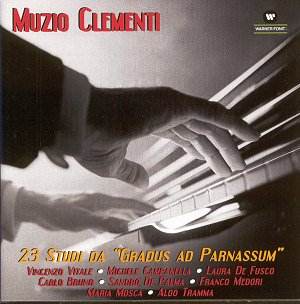The thought of listening to a sequence of 23 studies
by Clementi may well in theory deter all but the most dedicated pianophile.
The complete 'Gradus ad Parnassum' is an extensive work, originally
published in three separate volumes and composed over a huge stretch
of time. The booklet notes tell the purchaser that, 'On this CD are
the 23 obligatory studies ... for the intermediate piano examination
in accordance with ministerial regulations. Teachers and students have
at their disposal a "sound document" which is not only a pure and simple
didactic reference work but also a masterly "lesson" in piano interpretation
from the school of the late Maestro Vincenzo Vitale'.
Whatever the reasons for the choice of studies, the
decision to split the 23 excerpts between eight pianists means that
(to an extent) Warner Fonit can rise to the not insignificant challenge
of injecting life into pieces that are usually banished to the practice
room. It is certainly difficult to imagine anybody making space for
them in a recital (even as an encore), but the good news is that they
receive persuasive enough performances to justify the outlay for the
disc.
The honours are not, however, equally divided between
the pianists. Was it by accident or design that possibly the best-known
pianist, Michele Campanella, opens the proceedings?. Whatever the case,
his reputation precedes him, and one knows from his Liszt that one is
in safe hands and that, technically at least, there will not be a problem
(try his Complete Hungarian Rhapsodies on Philips Duo 438 371-2). To
his credit he instils shape into the Study No. 2 in F, just as his pearly
scales illuminate the quasi-Baroque delicacy of No. 5. His return later
in the programme with No. 65 in F reminds us (briefly: it lasts 46 seconds)
of his sure technical capacity for octaves.
Sandro De Palma impresses, particularly in the Study
No. 14 in F, 'Tulit alter honores (Virgilio)', a cross between a Haydn
keyboard sonata and the slow movement of Beethoven's Piano Sonata, Op.
2 No. 1 (Clementi's piece is actually a reduction of his own Op. 14
No. 1, originally for piano duet). The Haydnesque element surfaces once
more in De Palma's account of the Study No. 15 in C. By respecting the
'non troppo' qualifier to the 'Allegro', De Palma successfully projects
the complexity and drama of this Study (this is the most extended piece
on the disc, clocking in at 6'39). The dramatic use of the bass register
recalls Domenico Scarlatti's similar use of this device.
De Palma plays eight out of the 23 Studies in this
selection. His version of No. 59 in B flat is indeed the Presto the
composer requests, but it also a model of clarity. He also projects
the jubilant aspect of No. 78 in G well.
Maria Mosca serves as a stark contrast. Two of her
Studies concentrate on the equalization of five-note scalic fragments.
Whatever the low-lying level of inspiration, there is no doubt that
these could be more interesting: this is little better than typewriting.
Her account of No. 47 in B flat sounds contrived and the accents are
stabbed at. Laura De Fusco suffers from the same maladies in her accounts
of No. 36 in A (which really sounds as if one is eavesdropping on someone's
warm-up) and No. 44 in F minor.
Vincenzo Vitale himself plays the diverting little
canon of Study No. 26 on B minor affectingly (he is almost Bachian here).
He obviously relishes the more delicate studies: No. 63 in E flat is
(Domenico) Scarlatti-like, and he delivers it as such.
Aldo Tramma and Carlo Bruno are allocated one study
each. Tramma's Study No. 30 in E minor is accorded a more recessed recording
than the rest of the disc, possibly just as well as he pounds the left
hand mercilessly. Bruno gives an acceptable Study No. 32 in C (a study
in fast alternating notes which are not quite fast enough to be called
a trill).
The disc ends with two Studies played by Franco Medori,
whose fingerwork in Study No. 95 in C (subtitled 'Bizzarria') is pearly
and impressive, but whose account of No. 96 in C minor is neither the
'Allegro' nor 'agitato' of the tempo indication. A odd way to end a
mixed and somewhat strange disc.
Colin Clarke


